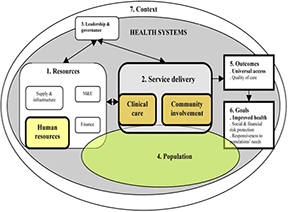Resource Spotlight: Positive Spill-Over Effects of ART Scale Up on Wider Health Systems Development
Global health initiatives have enabled the scale up of antiretroviral treatment (ART) over recent years. The impact of HIV-specific funds and programmes on non-HIV-related health services and health systems in genera has been debated extensively. Drawing on evidence from Malawi and Ethiopia, this article analyses the effects of ART scale-up interventions on human resources policies, service delivery and general health outcomes, and explores how synergies can be maximized.
The authors compiled data from Malawi and Ethiopia and developed a conceptual health systems framework for the analysis. Major changes in human resources policies were an entry point to explore the wider health systems changes. In both countries, the need for an HIV response triggered an overhaul of human resources policies. As a result, the health workforce at health facility and community level was reinforced. The impact of this human resources trend was felt beyond the scale up of ART services; it also contributed to an overall increase in functional health facilities providing curative, mother and child health, and ART services. In addition to a significant increase in ART coverage, we observed a remarkable rise in user rates of non-HIV health services and an improvement in overall health outcomes. [adapted from abstract]
View this resource.
The HRH Global Resource Center has other resources on this topic including:
- Capacity Module Application: Estimating the Human Resources to Scale Up ART in Uganda
- Patient Volume, Human Resource Levels, and Attrition from HIV Treatment Programs in Central Mozambique
- What Impact Do Global Health Initiatives Have on Human Resources for Antiretroviral Treatment Roll-Out? A Qualitative Policy Analysis of Implementation Processes in Zambia
For additional resources on this topic, visit the Antiretroviral Treatment subject category.
Past Resource Spotlights
- 3166 reads





